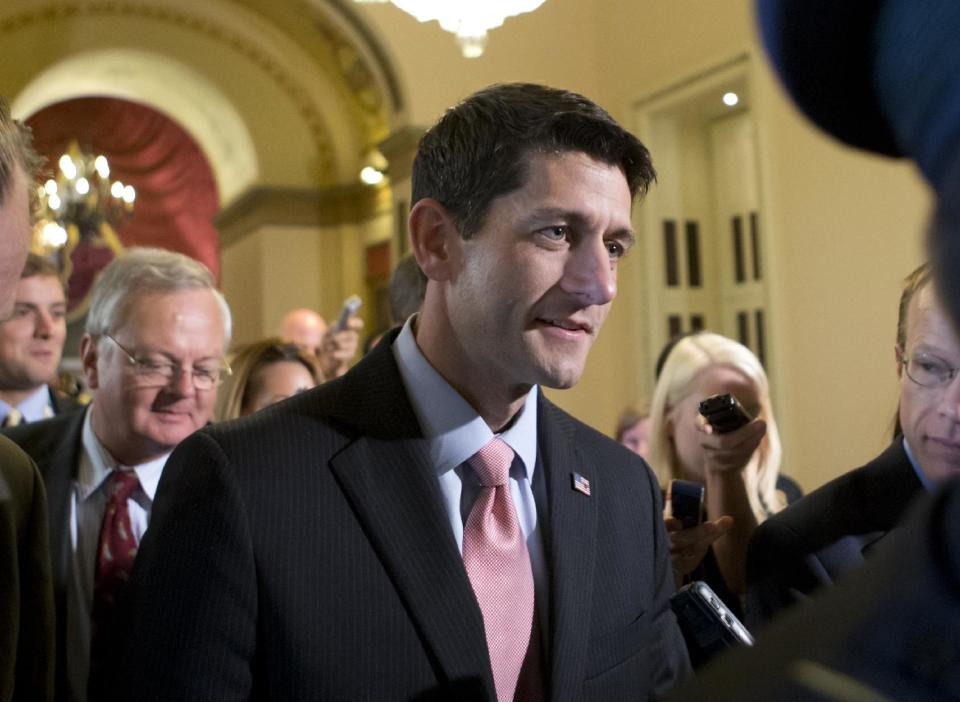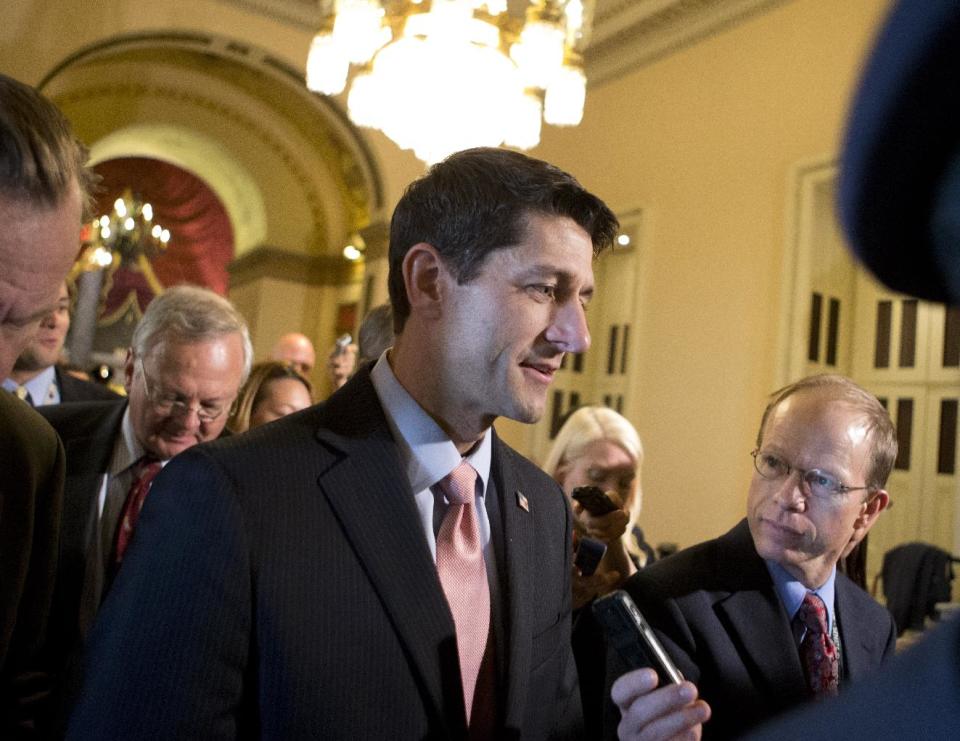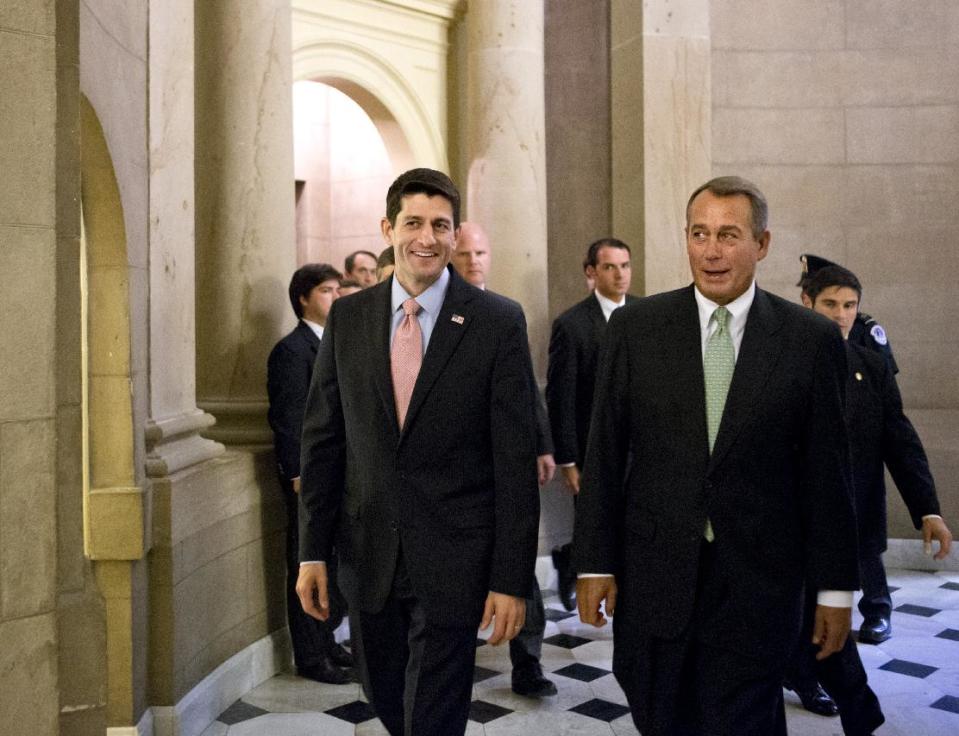Ryan votes for budget larger than he prefers
WASHINGTON (AP) — Republican vice presidential candidate Paul Ryan on Thursday went along with a stopgap spending bill in the House that avoids a government shutdown but carries a price tag $19 billion higher than the budget he wrote in his role as a congressman.
Ryan, the top budget writer in the House, voted for a temporary spending bill that lets Congress keep government open for another six months. That allows lawmakers and President Barack Obama to put off dicey budget talks until after the Nov. 6 election.
Politics, though, were not far from Ryan's first return to Congress since joining Mitt Romney's presidential bid. He met informally behind closed doors with Republican lawmakers in what aides described as a meet-and-greet event.
The House chamber later erupted in a loud cheer — mostly from the Republican side — when Ryan entered the hall. Ryan held court in the rear of the chamber as back-slapping colleagues surrounded him. Among those congratulating him was the top Democrat on the House Budget Committee, Rep. Chris Van Hollen of Maryland, with whom Ryan has an adversarial but friendly relationship.
Ryan did not deliver remarks on the House floor ahead of the vote approving spending far greater than his budget outline.
"The fact that a stopgap measure is necessary is another indictment of the president's failure to lead," Ryan's campaign spokesman, Brendan Buck, said.
Democrats, meanwhile, worked to highlight components of Ryan's budget proposals that would fundamentally change seniors' health care and young voters' education options. Democrats, including Obama's re-election campaign, have constantly linked Romney's presidential campaign with the Ryan-proposed cuts.
"Now there has been a lot of controversy about Mr. Ryan and some of the things he has stated," Sen. Chuck Schumer of New York said across Capitol Hill. "But perhaps the least credible claim of all about Congressman Ryan is the idea that he's a serious budget hawk, and that his budget is a serious attempt at deficit reduction. He's not, and it's not."
Practically taunting Republicans, the head of the House Democrats' campaign organization said Ryan's addition to the ticket was a big boost for Democrats' hopes of capturing control of the chamber. Rep. Steve Israel, D-N.Y., said Ryan's prominence helps amplify their claims that Republicans want to "end Medicare as we know it" as they cut taxes for the rich.
"Paul Ryan has become a down-ballot disaster for Republicans across the country," Israel said.
Ryan's budget would reshape Medicare for many future recipients into a voucher-like program and renew expiring tax breaks for the wealthy — both of which Democrats oppose.
Thursday's vote on the spending legislation was one of the last major actions lawmakers will take before leaving Washington for the fall campaign. The temporary spending bill was needed to avert a government shutdown when the current budget year expires Sept. 30.
The Senate, controlled by Democrats, is expected to pass the spending measure next week.
Thursday's vote represents a retreat of sorts by tea party House Republicans, who had insisted on no new spending. It was also something of a setback for Ryan, whose austere budget proposal was some $19 billion smaller than the version expected to pass.
Even though it abandons the GOP budget, the six-month spending measure has backing from conservatives who want to avoid the prospect of an omnibus spending bill in the postelection lame duck session and who hope to have greater leverage next year.
The spending measure is the last major piece of pre-election legislation from a Congress that's been mostly gridlocked from the moment it took the oath of office in January 2011.
___
Associated Press writers Andrew Taylor and Alan Fram contributed to this report.



